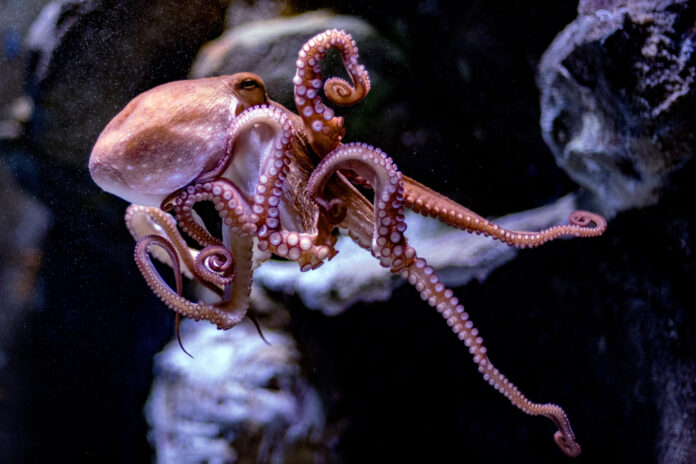The octopus has long captured human imagination as a mysterious and alien-like creature of the ocean. But in recent years, scientific research has increasingly suggested that this cephalopod may be one of the smartest animals on the planet. So, just how smart is an octopus? This question not only challenges our understanding of intelligence but also forces us to reconsider the boundaries between humans and other forms of life.
The Octopus: A Brain Unlike Any Other
To understand how smart an octopus is, we must first acknowledge its radically different biology. Unlike vertebrates, the octopus has a decentralized nervous system. Of its approximately 500 million neurons, more than two-thirds are located in its eight arms, not in its brain.
Each arm can operate semi-independently, capable of complex problem-solving and tactile exploration without direct input from the central brain. This distributed intelligence raises profound questions: is the octopus a singular thinking entity, or is each arm a partially autonomous mind?
Problem-Solving Skills: Evidence from the Lab
Research has repeatedly shown that octopuses can solve intricate puzzles, escape from tightly sealed containers, and even open jars to access food—behaviors that demonstrate advanced problem-solving capabilities.
One landmark study from the University of Otago in New Zealand documented an octopus unscrewing a jar from the inside to release itself—suggesting not only spatial awareness but also planning.
Additional experiments have shown that octopuses can:
Navigate mazes
Distinguish between different shapes and patterns
Exhibit short- and long-term memory
These findings place them in the company of some of the most cognitively advanced animals, including crows, dolphins, and chimpanzees.
Table of Contents
ToggleTool Use: A Sign of Higher Intelligence?
Tool use is often considered a hallmark of complex intelligence. In 2009, researchers in Indonesia observed the veined octopus collecting coconut shells and assembling them as mobile shelters—a behavior that suggests forward-thinking and environmental manipulation.
Such strategic behavior answers the central question: how smart is an octopus? Smart enough to modify and transport objects for future use—a level of intelligence rarely observed in invertebrates.
Play Behavior: A Measure of Cognitive Sophistication
Play is another indicator of advanced cognition, typically associated with mammals and birds. Marine biologist Roland Anderson observed octopuses repeatedly pushing objects, like bottles and floating toys, seemingly for amusement, even in the absence of food rewards.
This form of non-functional, repetitive play suggests the presence of curiosity, a trait previously thought to be almost exclusively human or mammalian.
The Mystery of Octopus Consciousness
Perhaps the most fascinating—and least understood—aspect of octopus intelligence is the question of conscious awareness.
Do octopuses possess a form of self-awareness?
Some researchers argue that their ability to recognize individual humans, display distinct personalities, and remember specific experiences hints at rudimentary consciousness.
However, their intelligence is fundamentally alien—evolved along a separate evolutionary path for over 500 million years. This makes the octopus not just smart in a familiar way, but smart in a profoundly different one.
How Smart Is an Octopus Compared to Other Animals?
| Animal | Neuron Count | Notable Intelligence Markers |
| ——- | ————- | ——————————————- |
| Octopus | \~500 million | Problem-solving, tool use, escape skills |
| Crow | \~1.5 billion | Tool making, complex memory |
| Dog | \~530 million | Social learning, emotion recognition |
| Dolphin | \~5.8 billion | Language-like communication, self-awareness |
While the octopus has fewer neurons than some mammals, its decentralized brain structure allows unique forms of intelligence that can’t be directly compared to that of vertebrates.
Ethical Implications: Rethinking Captivity
The growing recognition of octopus intelligence has prompted ethical concerns about their treatment in aquariums and scientific research. Countries like the UK and members of the European Union now classify cephalopods as sentient beings, requiring ethical consideration in experiments.
The recent rise of octopus farming proposals has sparked international debate, with animal welfare experts questioning whether such intelligent, solitary creatures can ethically be farmed for human consumption.
Final Thoughts: Intelligence, but Not as We Know It
So, how smart is an octopus? The answer is remarkably complex. Octopuses demonstrate problem-solving, memory, tool use, play behavior, and possibly even consciousness. Yet, their intelligence is so different from our own that it challenges the very definitions we use to measure cognition.
In studying octopuses, we are not just learning about an extraordinary animal—we are also learning about the diversity of intelligence itself.
Ultimately, octopus intelligence invites us to broaden our understanding of life, mind, and what it means to be smart on a planet teeming with unexpected forms of brilliance.








